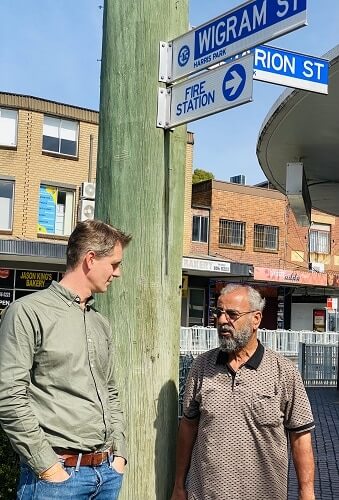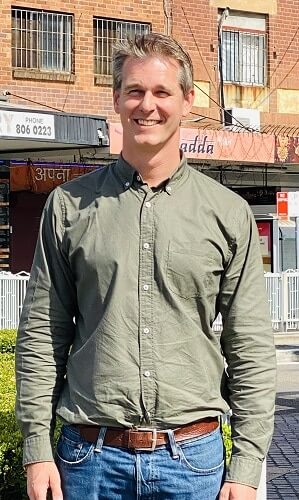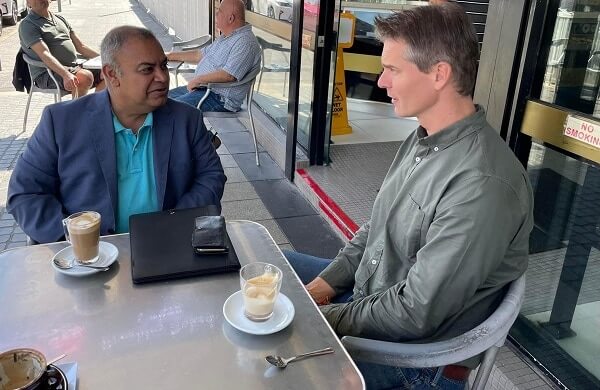Sitting down for a chat in his smart casualwear, it seems Andrew Charlton, ALP candidate for the marginal seat of Parramatta, was all set for a day of door-knocking potential voters in this crucial seat which the Labor party is desperate to retain.
“I actually quite enjoy talking to people and Parramatta is such a wonderful mix of communities,” he admitted. “I was born in Kenthurst and my father worked at Rheem factory for a number of years. For my education and work, I have spent a lot of time in other states and country, but I am a Western Sydney boy at heart.”
Currently held by retiring Labor member Julie Owens by a margin of 2.9%, Parramatta is turning to be quite the battleground. The Indian Australian community form one of the largest voting blocs here, with the heart and soul of the community living around Harris Park or what is known as Little India. With many temples and restaurants, small and medium businesses, and of course the community that lives here, there are lots of votes to woo.
Leading the charge for the Labor Party is Andrew Charlton.
Andrew is a Rhodes Scholar and has Masters‘ and Doctorate degrees in Economics from Oxford University.
Politically he was a senior economic adviser to PM Kevin Rudd during the GFC of 2008, and a senior govt official to the G 20 economic summits.
Professionally, he has worked at London School of Economics, has been a consultant to the United Nations, and is currently the managing director at Accenture, a leading global consulting firm.
Welcome to Indian Link Radio, Andrew. Given your professional background we’re tempted to ask you first up, why are you getting into the bare pit of politics now?
Thanks for having me, Pawan. Good question. The answer is that I have an opportunity to make a positive contribution and I see this community around Parramatta as incredibly strong. Parramatta is the future of Australia, a culturally dynamic community for me. It’s an honour to be selected as Labor’s candidate here.
Your preselection, Andrew, bypassing rank and file, has raised quite a few eyebrows. This is not an area that has been home to you. In fact, your candidature has been described as “wilfully disrespectful to the local community”. Your comments on this?
I think the media has slightly misreported this. The truth is that I was born northwest of here in Kenthurst. My dad worked for many years at the Rheem factory in Parramatta, and I have lived all over Australia and all over the world. I spent two years in Melbourne, two in Perth, seven years in England, three years in Canberra, and now I’m delighted to be back here in this part of Sydney. What matters to people when I talk to them, is they don’t care about the past, they want to know what you are going to do for this community in the future. They want to hear about our plans to make Parramatta a stronger, better place for all the people who have moved here.
I’ll come to those plans in a minute Andrew, but let me put it to you that migrants, particularly many second-generation migrants, care deeply about this country, and want to be in positions where they can see change for their communities. They see themselves as Australians first and are deeply motivated to participate in the decision making for their country to see it become better. When will the major parties recognise this motivation, and give them a platform?
I think diversity in politics is extremely important. The Labor party has selected some very good diverse candidates in this election. They have a mix of candidates across their electorates. I’m really proud of the progress that the Labor party has made. I think there is more work to do in Australia, and more work to do in corporate Australia.
Although I would say that we have made a lot of progress in corporate Australia. There are Australians of Indian heritage leading some of the biggest businesses here. Think about Stockland, Link, Mirvac, a number of companies that have Indian leaders. There’s some good progress in the business community and we need to make progress in politics as well.
You’ve been working hard on the campaign trail. What are you hearing about the concerns of the local community in Parramatta?
People come to Parramatta to make a better life for themselves, for their families, and to get ahead. People are talking to me about the financial pressures that they face, the cost of childcare, the rising cost of living, that it’s harder to make ends meet as a family. I hear a lot about the challenges that small businesses here are facing, that they faced through COVID, that they’re continuing to face. Last night we were at an Indian restaurant that’s been going for 12 years and we learned that the last three have been the toughest they’ve experienced. Trade is down because of COVID, particularly at lunchtime as people work from home, construction in the area has disrupted business, and it’s harder to find workers. Small business has been doing it pretty tough, particularly those that didn’t get the government support because they weren’t citizens, for example.

I’m hearing a lot about jobs – people want good jobs for themselves and they want those good jobs to be local. They don’t want to be driving into the CBD for a job with a good wage. They want those jobs to be here in Parramatta. And that has to be our vision for Parramatta.
What would you or the Labor Party do to ease the cost-of-living pressures on the community?
We have a plan to create that reality – a place where you can afford to live in and get a great job. On cost of living, we have a number of measures. Firstly, we have measures around childcare, to reduce (that burden) for all the families that struggle with it.
Secondly, we have a plan to reduce energy costs. Chris Bowen has outlined a clear plan, the strongest plan I think of any country, to keep control of energy costs.
And third, we have inflation now rising very rapidly – the price of groceries, the price of fuel. In order to reduce those inflationary pressures and keep the cost of living down, we have to be investing in the expansionary capacity of the economy. We have to be making sure there aren’t bottlenecks in infrastructure, or in skills, that drive up the price of wages and cause goods to become more expensive. We have to make sure that freight costs stay low.
____________________________________________________________
SCROLL DOWN TO WATCH: Up close and personal with Andrew Charlton
____________________________________________________________
You mentioned housing affordability, which is a major cause of concern for new migrants. House prices in Sydney are skyrocketing, and the Prime Minister has now announced certain facilities for first home buyers. How would you address the issue of a housing affordability?
The last time we were in government, Labor introduced lots of new measures for first home buyers to support them in the market, but the reality is that just throwing more money at the housing minority is not going to solve the problem in its entirety. What we really need to do, is to expand the supply of houses. And I don’t mean over development. I mean making sure that right across Sydney, we’re expanding the housing stock, putting houses in places where people want to live, making sure the transport infrastructure structure is good, the social infrastructure is good and the jobs are there.
Can you give me a practical example? When you say ‘more houses where people want to live where transport is available’ it spells ‘overcrowding and inner city’.
No, that’s not what I’m saying at all. I’m saying that as we expand the housing stock, including on the outer edges of the city, we are making those places desirable places to live, so that when people move into those areas, they have the infrastructure they need, so we can give them the housing they need without putting them all on top of each other, without making them smaller and smaller, without making them more expensive.
Secondly, we need to make sure that people aren’t burdened with too high interest rates. At the moment, the Reserve Bank is saying the interest rates will rise from their current historic lows. So some of the announcements that Labor has made are about being conservative in the budget, making sure the budget isn’t putting upwards pressure on interest rates.

We have a massive debt which has been built up over the last few years, especially during COVID times. What is the plan to pay down this debt? Any higher taxes, any other cuts? On one hand, you’re saying that we should be spending more money on infrastructure and other assets. How do you see the debt being tackled?
I’ll tell you this firstly. This debt was racked up by a Liberal government…
But this came at the time of COVID when they had to fund JobKeeper, JobSeeker, and other facilities. There was an easing of money supplies, and interest rates came up. And we have come out pretty well from what has happened, on a society level. Would you have done things differently?
Three things. Firstly, the increase in Australia’s debt occurred substantially before COVID. You’re right, that during COVID there was an even bigger step up in debt levels. But the Liberal government has been increasing Australia’s debt well before COVID began.
Secondly, a lot of the money that was spent in COVID times was wasted. Think about the $22million in JobKeeper that went to Harvey Norman. Think about all the big businesses that were collecting JobKeeper money while their profits were going up.
Third, when we were in government – and I worked during the GFC – we had very clear fiscal rules to come out of the crisis. So we said when we come out of the crisis, we’ll include rules that govern our future spending, make sure that taxes don’t rise, make sure that expenditure doesn’t rise, and see that we get it back down.
That was the framework that we put in place to manage the deficit after a crisis. This government has put in place no such framework. They have not created a pathway back to surplus. In fact, in their own documents, there is no pathway back to budget surplus for the next forty years. I think that’s the wrong approach for a government, and I’m pleased to see that Anthony Albanese and Jim Chalmers have been very prudent in their spending commitments and forward management of the budget.
How will they tackle our $1trillion debt?
Both have been very clear that they will manage the budget conservatively and I think you can already see that. This election campaign on the Labor side has not been a big spending election campaign. They have made important, but in no way reckless, spending promises. I think the reason for that is that they do recognise the size of the debt that has been built up, and the necessity to be restrained in future spending in order to reduce that debt over time.
We have seen the value of migrants for the economy. Should we increase the flow of migrants to Australia to further accelerate economic growth?
Well, I think we’ve had far too few migrants during COVID. And of course that needs to go up. Migrants are essential to Australia’s future, just as they have been to building the Australia that we know and love today.
Think about the Indian community – the fastest growing community in this country in terms of migration. One in 25 Australians now has some South Asian heritage. We should be very proud of that. I have had personal links myself. I’ve been to India three times. I was part of the Australia India Youth Dialogue a few years ago, and I think the Indian community in Harris Park, or as it should be known Little India, is the heartbeat of the Indian community in Sydney.
And I would like to see this become the real and the metaphorical centre of Sydney’s Indian community – a tourist destination where people come from all over Sydney, indeed all over the world, to experience the city’s Indian heritage.
160,000 migrants are coming to Australia annually. Should that number be increased?
I do believe that the number should be increased from previous levels, but I’ll leave it to Labor spokesperson Kristina Kenneally to make that announcement. But I can certainly say that I do believe that migrants have built Australia and are central to our future. In particular, Indian migrants who bring us their skills, who are some of the biggest taxpayers in this country, and who are some of the biggest contributors to our society – they’re an essential part of our future.
The younger voters seem, on the whole, to be quite disgruntled with the major parties – they have concerns that they think are not being addressed with the urgency that is required. How are you reaching out to younger voters, Andrew?
Look, I think the younger voters are right. They’re right to be despondent, you know. If they look at their future, there are challenges out there. Think about the issues that matter to them, about the long-term prosperity of Australia. There’s been very little significant long-term policy reform over the last ten years, in say climate change, jobs and skills, and the ability to buy a house.
I think we need to turn that around. I think we need to make sure that young Australians feel like their government backs them; that if they do the hard work, get a good education, the Australian dream is there for them no matter who they are, no matter where they come from.
And so, for Labor, that means having a very strong policy around education. We have very significant increases to support TAFE; more university places, Tanya Plibersek has announced pathways towards full Gonski funding for schools. I think young Australians should be confident that there is a party out there that wants to do long-term policy making, to make the future better over decades to come as they become working partners of Australia’s economy.
Why should voters in Parramatta elect you?
Voters in Parramatta should elect me because I have the experience and the energy, and I have a plan for Parramatta’s future. In many ways Parramatta’s future is Australia’s future. This should be the best multicultural city in the world. A place of diversity, a place where we have great jobs, good housing, where people can live and work, and be part of different communities in close proximity.
That’s my smart plan for Parramatta and I look forward over the coming weeks to present it to as many people in this electorate as I can, and I look forward to their support.
READ ALSO: Maria Kovacic, the Coalition candidate for Parramatta





